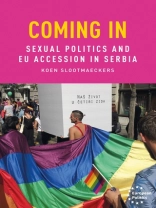LGBT rights have become increasingly salient within the EU enlargement process as a litmus test for Europeanness. But the promotion of these norms has provided a basis for political contestation. This book interrogates the normative dimensions of the EU enlargement process, with special reference to LGBT politics. Reconceptualising Europeanisation, it argues that EU enlargement is a process of negotiated transformation in which EU policies and norms are (re)defined, translated and transformed. Empirically, it analyses the promotion of and resistance to LGBT equality norms in Serbia’s EU integration process, but it looks beyond policies to the impact of the negotiated transitions on lived experiences. Overall, the book raises important questions about the political and social consequences of Europeanisation. At its heart is one crucial question: what do we consider progress?
Daftar Isi
Introduction
Part I: rethinking Europeanisation and EU-Serbia relations
1 Europeanisation as negotiated transitions: Towards a relational and transnational approach to EU enlargement
2 Mapping the multi-layered normative structure of Serbia-EU relations
Part II: Adopting, resisting, and transforming law and practices
3 Anti-discrimination policies: From the margins to differentiated politicisations
4 Taking it to the streets: Belgrade Pride as a litmus test for Serbia’s Europeanisation
Part III: Looking beyond policy towards lived experiences
5 The attitudinal panopticon and the limited implementation of the anti-discrimination framework
6 The emergence of the Ghost Pride and the transnational dislocation of LGBT politics
Conclusion
Epilogue
Index
Tentang Penulis
Koen Slootmaeckers is a Senior Lecturer in International Politics at City, University of London












